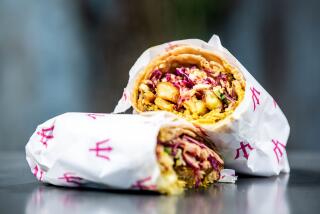Farmers Markets: The Produce Project repackages the bounty
- Share via
While farmers markets have proliferated in recent years, demand for fresh, local, seasonal produce has increased even faster. Several types of entrepreneurs have arisen to satisfy this demand, including specialty produce distributors, shopping services and stores that emulate the farmers market experience, such as Atwater Village Farm. One intriguing variation is the Produce Project, which buys from farmers markets and sells at “pop-up farm stands” in downtown L.A. and Mid-City.
It’s the brainchild of farmers market fans Sarah Delevan and Shaheda Sadhal, both in their early 30s. Delevan has an MBA in marketing, while Sadhal majored in English literature before working as a recipe writer and private chef. They met in February when separately considering whether to open a produce boutique in Santa Monica.
They decided not to because of the high overhead and because the city was already well served by its farmers markets. Pondering alternative business models, they realized that many customers in other areas would like to buy premium farmers market produce but don’t have a market at a convenient time or place. Ultimately, farmers markets are limited by the number and availability of real farmers.
“We were at the Small Farm Conference and kept hearing that only 4 to 5% of the population shopped at farmers markets,” recalls Delevan. “We thought, ‘How can we get this great food, so healthful, so beautiful and grown so well, to more people?’ ”
They came up with a plan, visited more than a dozen farms to check their horticultural practices and on July 11 launched their first weekly event at Handsome Coffee Roasters in the downtown arts district. (There are several other farmers markets downtown, but none in that immediate area, ironically near the wholesale produce terminal.)
Delevan and Sadhal say that now they are “open to finding a permanent home in a well-suited community,” namely starting a full-time store. Angelenos can find the best produce in the world at farmers markets, and some supermarkets have tried to raise the bar by offering more local and specialty items, but so far there’s no permanent market that showcases a wide variety of the region’s best produce. Much top-quality produce is highly perishable and thus more suited to nimbler farmers markets than to the inventory systems of conventional stores, but it seems likely that entrepreneurs will pursue this strategy before long.
Early in the week, Delevan and Sadhal pre-order from farmers. On Wednesday mornings they rent a refrigerated truck, pick up their orders at the Santa Monica market and browse the latest offerings. From 5 to 8 that evening, they display the produce at Handsome Roasters in attractive wooden boxes, labeled with varieties, farms, growing locations and preparation tips.
The idea is that local consumers gain convenient access to high-quality produce, the store gains connections with the community and the partners profit. Leftovers are sold to restaurants or donated to charitable organizations.
Two weeks ago they started a new location at Paper or Plastik Café on Pico Boulevard near Fairfax Avenue, from 4 to 8 p.m. on Thursdays, where they concentrate on delivering weekly “farm boxes” to subscribers as well as offering some produce a la carte. They also shop at other reputable farmers markets, such as the Hollywood and Mar Vista ones, and have started selling to restaurants.
“It’s another road to getting the food onto people’s plates,” says Sadhal.
They typically carry more than 50 produce items, focusing on seasonal, organic and super-flavorful produce. Their current selection includes carrots from Weiser Family Farms, Brussels sprouts from Rutiz, rainbow chard from Coleman, White Pearmain and Sierra Beauty apples from Windrose Farm and Fuyu persimmons from Garcia. They also supply sauerkraut and pickles from Sqirl, “lasagna cupcakes” from Heirloom LA and beef from Rancho San Julian (on special order).
Properly, Delevan and Sadhal don’t call their venture a “farmers market” and don’t use the term “community-supported agriculture” in referring to their weekly produce boxes.
“We’re certainly not farmers, and we don’t want to portray ourselves as such to anyone,” says Delevan.
Quality, provenance and convenience come at a price: Last week Delevan and Sadhal sold apples for $5 a pound, almost twice the cost direct from the grower. Purists may scoff at the overlay of middlemen on direct marketing, but the Produce Project’s business model is transparent and may arguably be preferable to that of the many third-rate farmers markets where commercial produce masquerades as homegrown.
More to Read
Eat your way across L.A.
Get our weekly Tasting Notes newsletter for reviews, news and more.
You may occasionally receive promotional content from the Los Angeles Times.










